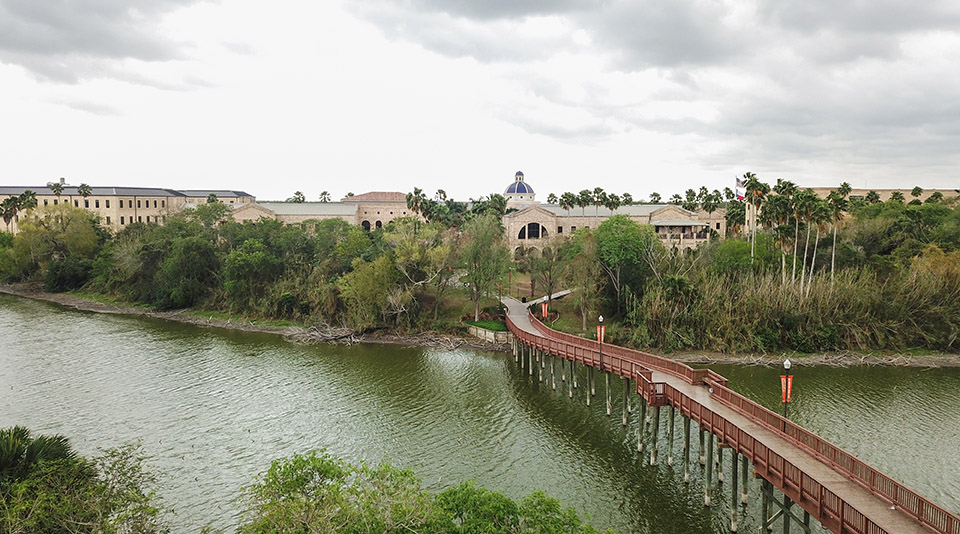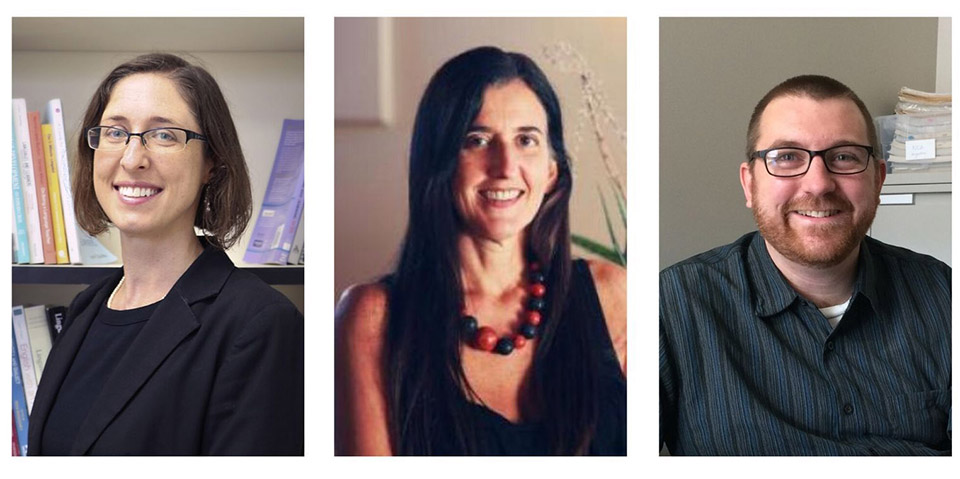
(UTRGV Archival Photo by David Pike)
News Release | Awards & Grants

(UTRGV Archival Photo by David Pike)
Thursday, May 21, 2020
Research, Faculty Focus
By Victoria Brito
RIO GRANDE VALLEY, TEXAS – The National Endowment for the Humanities (NEH) has awarded two UTRGV professors and their University of Arizona collaborator a grant for a project on bilingualism on the U.S. Mexico border.
UTRGV’s Dr. Katherine Christoffersen, the project director and principal investigator on the grant, with Dr. Ryan Bessett (UTRGV, co-PI) and Dr. Ana Carvalho (University of Arizona, co-PI), have received an almost $60,000 Humanities Collections and References Resource grant for their project, Bilingual Voices in the U.S./Mexico Borderlands.

As a multi-site project, it will document language in the Rio Grande Valley and in Southern Arizona by expanding development of two website-based collections of interviews with community members, the Corpus Bilingüe del Valle (CoBiVa) and Corpus de Español del Sur de Arizona (CESA).
Christoffersen and Bessett completed their PhDs at the University of Arizona with Carvalho, who created the Southern Arizona corpus. Inspired by her work, the three submitted a proposal to NEH in July 2019.
Christoffersen, an assistant professor in Applied Linguistics, said the research team is excited to move forward on the project and to continue documenting language in the Rio Grande Valley.
“Linguists have known for decades that code-switching – using Spanish and English together – is a highly sophisticated skill,” Christoffersen said. “Through the systematic study of language, we hope to increase this understanding and the prestige of code-switching and local language varieties among students and community members.”
The funding will be used to test various transcription methods aided by technology – like reporting on the accuracy and speed of revising auto-generated transcripts.
The team also will be able to fund student participation in research through the grant.
They will share their findings at conferences and in publications, webinars and workshops, in the hope of inspiring the creation of more community-based, community-driven corpus projects.
Beyond their importance for scholarship, the corpora are valuable local resources for the community, and for teaching Spanish to Heritage Language Learners.
“Bilingual dialects are commonly stigmatized. This is especially true of the Spanish spoken along the US-Mexico border,” said Bessett, an assistant professor of Hispanic Linguistics. “The research team hopes that local teachers will use CoBiVa as a tool in Spanish and dual language classrooms. By bringing a corpus of local, bilingual Spanish into the classroom, it legitimizes the linguistic variety and elevates its status in the community.
“In addition, by comparing this bilingual corpus to monolingual ones, students are able to see that many of the forms they use which they interpret as ‘incorrect’ are actually found in monolingual communities as well,” he said.
The CoBiVa website (www.utrgv.edu/cobiva) includes a blog that will feature updates to the project, and a list of related presentations and publications.
Pending a short online request form, anyone can access the actual collection of revised, anonymized interviews with audio files, clickable transcripts and background and demographic information on the interviewees.
Christoffersen and Bessett plan to have 50 interviews and audio files posted on the website by December 2020.
ABOUT CoBiVa
Corpus Bilingüe del Valle (CoBiVa) documents the Spanish and English spoken in South Texas, specifically in the Rio Grande Valley. Graduate and undergraduate students, under the PIs’ supervision, collect, transcribe and analyze interviews with local speakers. This digital oral corpus provides material for multiple linguistic analyses of local language varieties and subsequent comparisons with other varieties, as well as a pedagogical tool for teaching Spanish as a Heritage Language.
The project has been made possible in part by the National Endowment for the Humanities: Exploring the Human Endeavor and The University of Texas Rio Grande Valley.
To learn more, visit utrgv.edu/cobiva.
ABOUT UTRGV
The University of Texas Rio Grande Valley (UTRGV) was created by the Texas Legislature in 2013 as the first major public university of the 21st century in Texas. This transformative initiative provided the opportunity to expand educational opportunities in the Rio Grande Valley, including a new School of Medicine and a School of Podiatry, and made it possible for residents of the region to benefit from the Permanent University Fund – a public endowment contributing support to the University of Texas System and other institutions.
UTRGV has campuses and off-campus research and teaching sites throughout the Rio Grande Valley including Brownsville (formerly The University of Texas at Brownsville campus), Edinburg (formerly The University of Texas-Pan American campus), Harlingen, Weslaco, McAllen, Port Isabel, Rio Grande City and South Padre Island. UTRGV, a comprehensive academic institution, enrolled its first class in the fall of 2015; the School of Medicine welcomed its first class in the summer of 2016, and the School of Podiatric Medicine in the fall of 2022.